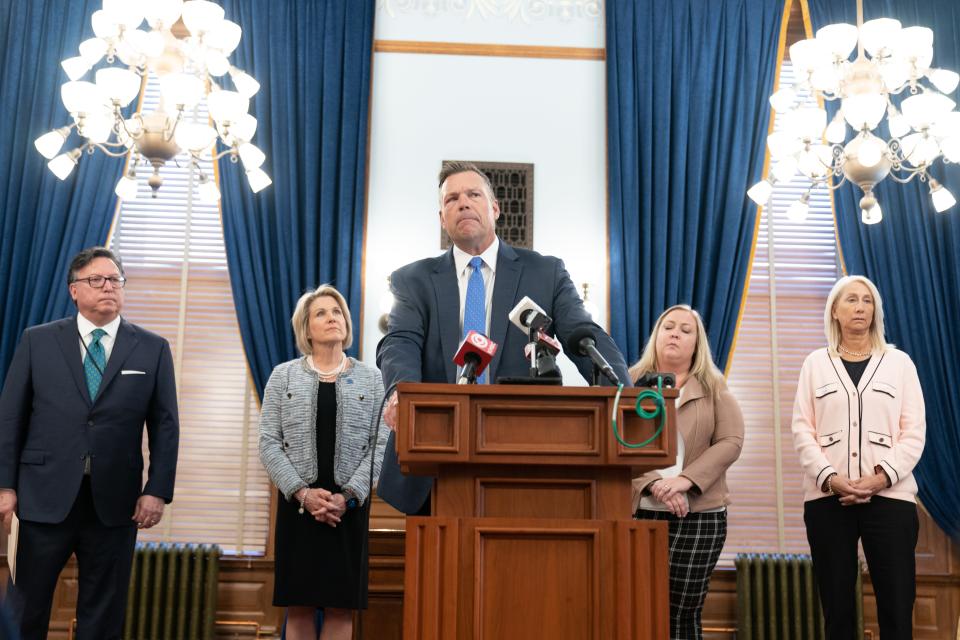Transgender Kansans decry SB 180 impact as new law takes effect statewide
- Oops!Something went wrong.Please try again later.
- Oops!Something went wrong.Please try again later.
Last week, Attorney General Kris Kobach took the stage at a news conference to announce his interpretation of a first-in-the-nation law designed to strictly define sex in a way that transgender rights activists say erases their community.
In Kobach's estimation, Senate Bill 180 would require the state to stop allowing Kansans to change the gender marker on their driver's license or birth certificate. But he didn't feel the law had much day-to-day impact.
"Very little changes," Kobach said. "It just means that changing your birth certificate is not an option, and that your driver's license will in Kansas reflect your sex at birth. But you can certainly appear in the picture any way you wish on the driver's license."

His words infuriated Justin Brace, who was sitting in a driver's license office, streaming Kobach's news conference on his phone while waiting to change the gender marker on his own ID.
Brace, who leads Transgender Kansas, said he personally knows at least six individuals who have died by suicide since the bill was enacted in late April over the veto of Gov. Laura Kelly. All of them, including Brace's partner, cited SB 180 as part of the reason for their suicidal ideation.
"They said they were no longer going to be safe in this world," Brace said after a rally opposing SB 180 at the Statehouse on Friday. "They were no longer going to be able to live as themselves. They were going to become homeless because their parents would kick them out. They said that politicians would never stop and life was never going to be worth living and that they weren't happy."
A legal battle is ultimately set to resolve the question of gender marker changes, with Kelly saying on Thursday that her state agencies didn't agree with Kobach's interpretation of the law and still would allow the changes. Kobach, in turn, promised to sue.
But transgender individuals say that no matter what happens, the law will have the effect of sanctioning harassment against them in public spaces.

Amy Helmer, a Lawrence community organizer and college student, said SB 180 was a sign that lawmakers have little understanding of the reality facing individuals like them who identify as gender nonbinary.
“Even if it doesn’t have ways it can clearly impact our rights, it allows people who hate us and want to discriminate against us ways to do so,” they said.
Transgender residents fear ban on gender marker in Kansas
When lawmakers in Topeka passed SB 180, which formally took effect on July 1, the focus of the bill was largely on how it would impact public facilities, such as bathrooms, changing rooms and even domestic violence shelters.
The text of the bill defines "male" and "female" in strict biological terms and says that for data collection purposes, an individual in Kansas is counted in line with their sex assigned at birth.
Kobach and Kelly agree the bill won't have any statewide impact requiring transgender residents to use bathrooms and other facilities that align with their sex assigned at birth. But legislators have said the measure still is achieving its intended purpose of protecting cisgender women.
"You can live and feel however you want," said Sen. Renee Erickson, R-Wichita. "But we are doing this based on biological fact, which is what we need in order to run the state and the state business."
But transgender individuals say the gender marker issue is far from an idle one.
If the state did ultimately have to change its own data to revert birth certificates and driver's licenses back to an individual's sex assigned at birth, the move would impact at least 1,300 Kansans who have changed one or both of those documents since 2019.
When state ID documents conflict with an individual's passport or Social Security card, it can inadvertently reveal their identity as transgender while they are traveling or handling their financial affairs at a bank.
Ty Goeke went to change the gender marker on his driver’s license last week, as did scores of other transgender Kansans. Speaking after a rally Friday, he showed off his temporary slip of paper, given out by the driver’s license office until a permanent replacement could be mailed.
The change prompted a wave of emotion shared between Goeke and his wife, Mallory.
“For me, I don’t look like a female at all,” Ty Goeke said. “I like it that way. … For me to go into a bathroom and not have a marker that represents who I am is terrifying.”
Mallory Goeke carried a stylized toilet, encouraging lawmakers to “flush” the law down the drain. The “celebratory” nature of Ty's marker change was dragged down by the likely legal fight over SB 180, she said.
“Now Kobach wants to take that away from him,” she said. “That’s not OK.”
Trans allies say the fight over SB 180 is personal for them as well

For Ariona Miller, the issue is deeply personal. A Marysville native, she said she has watched her transgender brother, who is a couple years younger, deal with barbs and hatred from classmates growing up in the rural community.
When she goes off to her freshman year at Duke University, she worries about what life will be like for her brother.
“He is not as outspoken as I am,” Miller said. “I take a lot of flack, and I don’t expect other people to do that.”
But Miller also is impacted by SB 180 in other ways. She is currently working with doctors to see if she is intersex.
While SB 180 does explicitly address the case of intersex Kansans, it guarantees accommodations under the Americans with Disabilities Act if a person has “a medically verifiable diagnosis of disorder/differences in sex development.”
"Everyone has value and we should let everyone have an identity," Rep. John Eplee, R-Atchison, said before adding the language to the bill in committee. "Otherwise, we’re going to leave some people’s identity on the sidelines and it's not going to go well."
This language, Miller said , preserves an outdated view of intersex people as disabled or needing to be fixed.
“There is nothing wrong with them,” she said.
A timeline on when the court battle over the exact impact of SB 180 remains unclear. Kobach has not yet formally sued Kelly.
Kobach filed last month a request to undo a legally binding agreement to allow gender marker changes on birth certificates, a response to a federal court case brought in 2018 by a group of transgender residents. Attorneys representing those individuals have yet to respond to Kobach's motion.

In the meantime, Matthew Neumann, a Larned resident, said his statewide LGBTQ+ support group has seen a major spike in participation since SB 180 was passed.
“We are not going to go silently,” Neumann said. “We will fight it tooth and nail legally every step of the way. It’s just to create fear, that’s what they’re doing, and we’re not going to let it affect us."
Editor's note: The original version of this story used incorrect pronouns for an individual who was quoted. The Capital-Journal regrets the error.
This article originally appeared on Topeka Capital-Journal: Transgender Kansans lament impact of SB 180, state's gender marker ban

